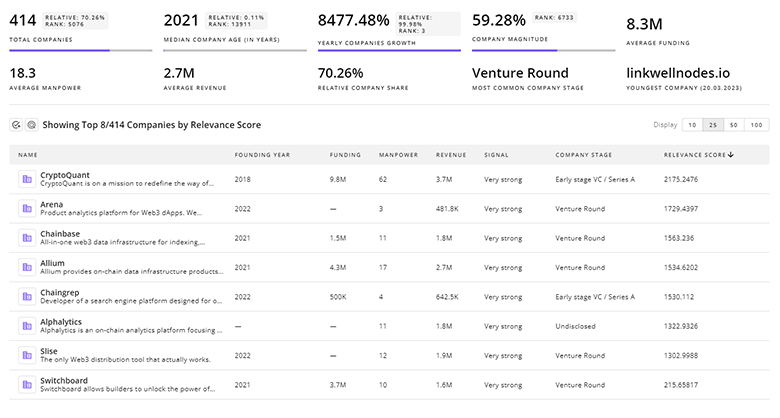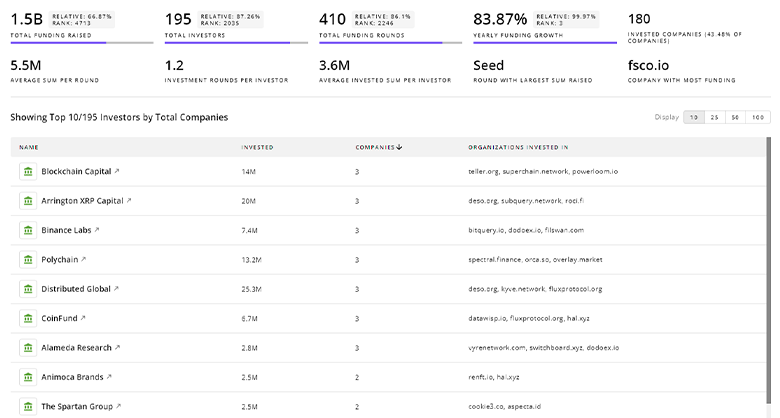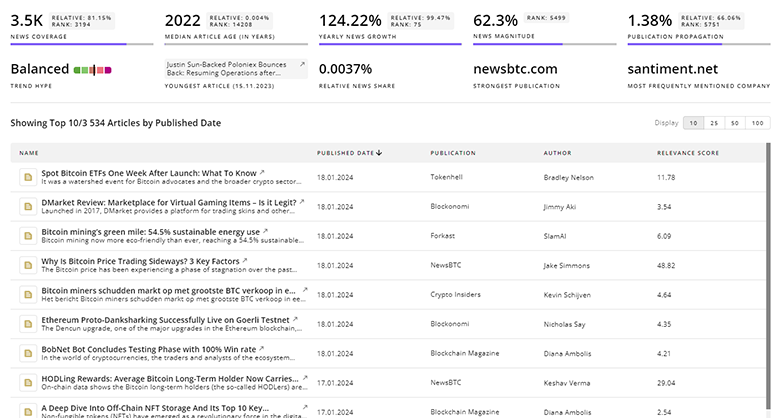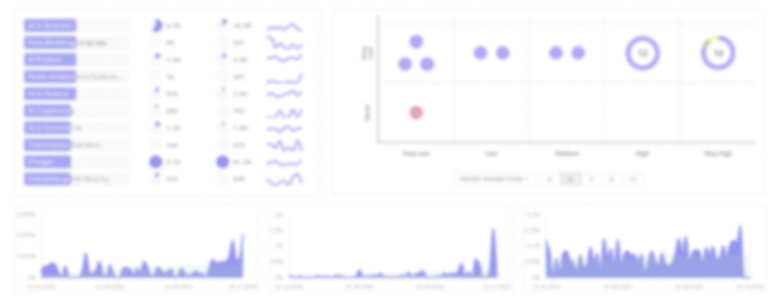
Revenue Cycle Management Report
: Analysis on the Market, Trends, and TechnologiesThe revenue cycle management (RCM) domain is experiencing robust growth driven by healthcare systems’ need to manage patient service revenue effectively from initial encounters to final payments. This revenue cycle management report reflects a significant market presence and adoption of RCM within healthcare systems globally. With a total funding of $12.1 billion and annual revenue of $94.65 billion across companies in this domain, RCM’s importance is evident. The sector is witnessing a surge in interest, market penetration, and investor confidence, indicating a promising future for businesses and investors focused on healthcare administration.
This report was last revised 648 days ago. See a missing piece? Your input can help — contact us.
Topic Dominance Index of Revenue Cycle Management
The Dominance Index for Revenue Cycle Management delivers a multidimensional view by integrating data from three key viewpoints: published articles, companies founded, and global search trends
Key Activities and Applications
- Patient Registration & Data Collection: Accurate data collection at this stage is crucial for the smooth processing of claims and billing.
- Insurance Eligibility Verification: Automating the verification of the patient’s insurance coverage, including checking the details of the policy, copayments, and deductibles.
- Digital Payments: Decrease days to pay on outstanding invoices, benefitting healthcare institutions and patients.
- Compliance & Regulatory Management: Ensuring that all RCM activities comply with applicable laws and regulations, including HIPAA and other healthcare-related legal requirements.
- Reporting & Analytics: Regular analysis and reporting on the RCM process to identify areas for improvement, track key performance indicators (KPIs), and ensure that the revenue cycle is operating efficiently.
- Outsourcing RCM Functions: To improve efficiency and reduce administrative burdens, healthcare providers outsource their RCM functions to specialized firms.
Emergent Trends and Core Insights
- Specialty-specific RCM: RCM solutions customized for specific fields like oncology, orthopedics, and anesthesia.
- Automation: Adoption of AI, machine learning, and RPA to enhance billing processes and operational efficiency.
- Patient-Centric Billing: Enhancing the patient experience by making billing more transparent, understandable, and flexible. This includes offering multiple payment options and user-friendly digital interfaces.
- Investments: Strategic investor interest in RCM, reflecting confidence in the sector's growth potential.
- Predictive Analytics: Identifies patterns that enable proactive denial management, patient payment behavior analysis, and claim submission optimization by analyzing historical data.
- Focus on Denial Prevention: Mitigating denials ensuring improved data accuracy, comprehensive documentation, and regular training of staff on the latest coding updates and regulations.
Technologies and Methodologies
- Cloud-Based RCM: Cloud technology allows for scalable, flexible RCM operations with lower upfront costs and improved data security while ensuring real-time data access.
- Artificial Intelligence (AI): AI and machine learning algorithms automate data entry, improve the accuracy of medical coding, and optimize patient payment scheduling.
- Telehealth Billing Solutions: Specific solutions to ensure accurate billing and compliance for virtual care services.
- Predictive Analytics: Using machine learning and data analytics to predict trends such as potential claim denials, patient payment behaviors, and optimal pricing strategies.
- Blockchain: Although still in the early adoption stages in RCM, blockchain ensures secure, transparent record-keeping and billing to reduce fraud and ensure data integrity.
Revenue Cycle Management Funding
A total of 335 Revenue Cycle Management companies have received funding.
Overall, Revenue Cycle Management companies have raised $12.5B.
Companies within the Revenue Cycle Management domain have secured capital from 934 funding rounds.
The chart shows the funding trendline of Revenue Cycle Management companies over the last 5 years
Revenue Cycle Management Companies
TrendFeedr's Companies feature is your gateway to 3.0K Revenue Cycle Management companies.

3.0K Revenue Cycle Management Companies
Discover Revenue Cycle Management Companies, their Funding, Manpower, Revenues, Stages, and much more
Revenue Cycle Management Investors
The Investors tool by TrendFeedr offers a detailed perspective on 428 Revenue Cycle Management investors and their funding activities. Utilize this tool to dissect investment patterns and gain actionable insights into the financial landscape of Revenue Cycle Management.

428 Revenue Cycle Management Investors
Discover Revenue Cycle Management Investors, Funding Rounds, Invested Amounts, and Funding Growth
Revenue Cycle Management News
TrendFeedr’s News feature allows you to access 4.6K Revenue Cycle Management articles as well as a detailed look at both historical trends and current market dynamics. This tool is essential for professionals seeking to stay ahead in a rapidly changing environment.

4.6K Revenue Cycle Management News Articles
Discover Latest Revenue Cycle Management Articles, News Magnitude, Publication Propagation, Yearly Growth, and Strongest Publications
Executive Summary
The revenue cycle management ecosystem is evolving rapidly, with a clear focus on enhancing healthcare administration through technology and specialized services. The sector's growth is fueled by a combination of investor interest, market penetration, and technological advancements. As companies continue to innovate and provide tailored solutions, RCM is poised to play an increasingly vital role in the healthcare industry, ensuring financial viability and improved patient care outcomes.
Partner with us to offer cutting-edge insights into trends and tech. We welcome your input.













